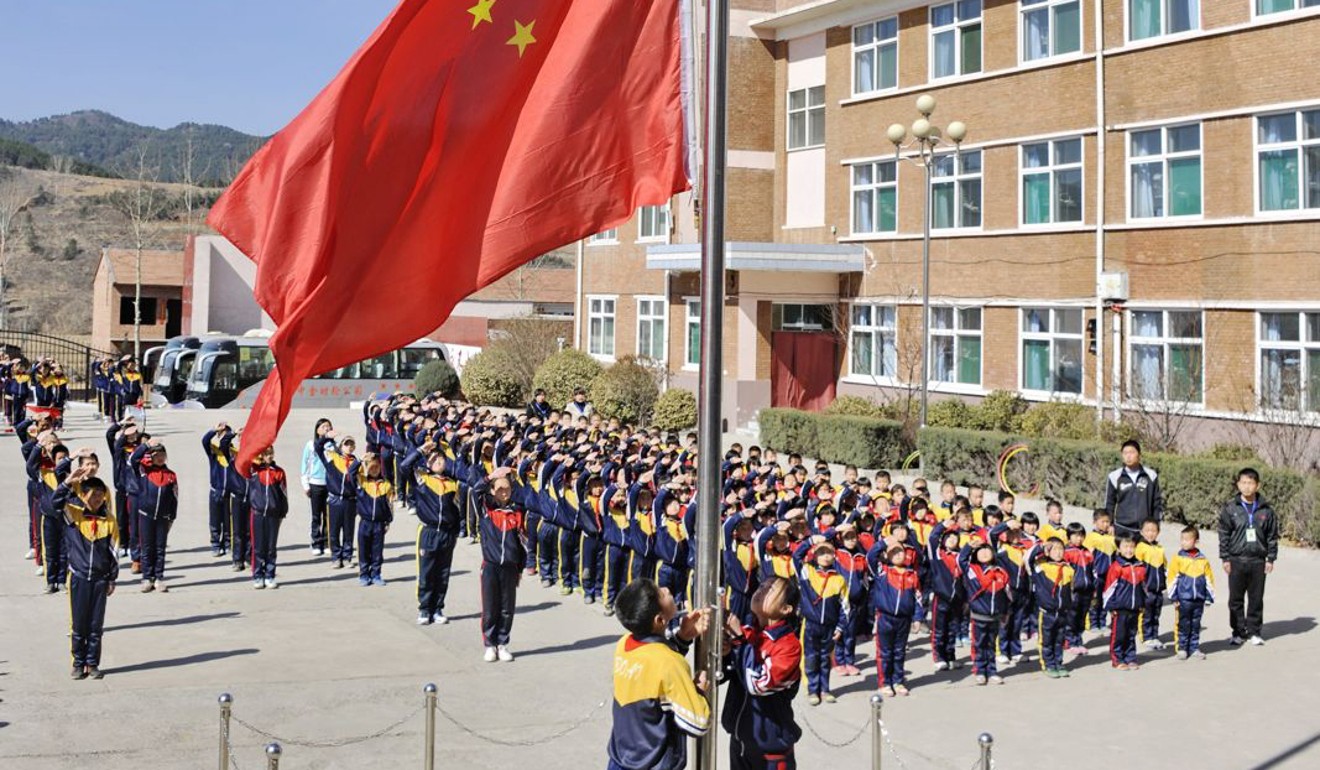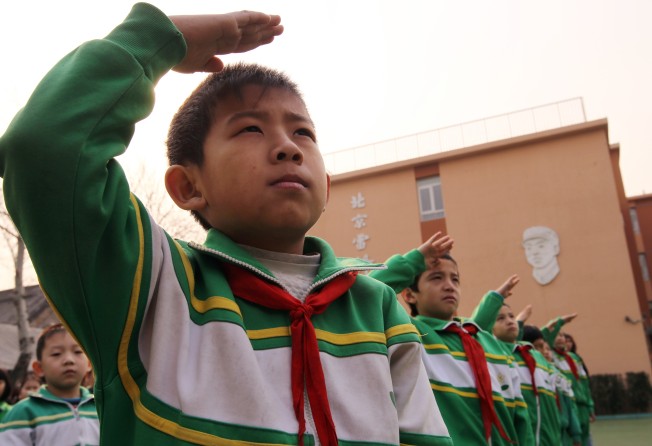
How national anthem law is being applied more strictly in Hong Kong than in Beijing
- International schools on mainland China given flexibility when it comes to teaching the song as part of the curriculum
- In Hong Kong government officials say all pupils in the city will be required to learn it

Every Monday morning, students in public schools across Beijing assemble on their sports grounds for the weekly flag-raising ceremonies.
They stand solemnly and sing March of the Volunteers as the flag is raised. The Chinese national anthem also blares out over loudspeakers, so even pedestrians outside the school premises hear it.
Two years after mainland China introduced its national anthem law, partly to encourage learning and singing the song in schools, Beijing’s public schools are complying.
At private international schools in the capital, however, the anthem does not figure prominently. It is rarely heard, and teaching students about it is not on the curriculum.
A director of a private international kindergarten and primary school said it did not receive any notice from Beijing’s education authorities about the anthem law, and officials he spoke to told him there were no “top-down guidelines”.
“It is a non-issue in Beijing,” said the director, who asked not to be named.

The national anthem’s place in schools has become a hot topic in Hong Kong, as the city’s legislature scrutinises a bill which will criminalise any public and deliberate act that insults the song, with penalties of up to HK$50,000 (US$6,377) or three years in jail. The bill is expected to be passed by the Legislative Council and take effect later this year.
The bill covers primary, secondary, international and special schools, regardless of how they are funded and the curriculum they teach. The secretary for education will issue directions to schools on what they need to do regarding the anthem, but no punishment is specified for those who fail to comply.
China’s top legislative body added the new law into Hong Kong’s mini-constitution, the Basic Law, in November 2017, soon after the mainland’s national anthem law was passed and took effect on October 1.
The mainland law criminalises disrespect of the anthem, and anyone found abusing it for commercial advantage, or who publicly and intentionally insults the song, faces a penalty of up to three years in prison.
The law also stipulates that primary and secondary schools should regard the anthem as an important part of patriotic education. They are expected to teach students to sing it, help them understand the history and spirit of the song, and how to behave while singing it.
Similar requirements are spelt out in the Hong Kong bill. But while the mainland law is silent about whether international schools are covered, the Hong Kong government has said its proposed law will apply to them too.
There are about 50 international schools in Hong Kong, including 22 run by the English Schools Foundation. While they cater mainly to the children of foreigners living or working in the city, some Hong Kong parents also enrol their children in them.
Mainland authorities appear to have given international schools flexibility with the national anthem.
The Post called seven major international schools in Beijing and, posing as a parent, asked if they played the anthem, encouraged their students to sing it, or taught them about it. Practices varied from school to school.
Three of the international schools are run by the government and attached to local ones, taking in international and Chinese students. One of them, Tsinghua International School, does not hold a weekly flag-raising ceremony, while the other two, the High School Affiliated to Beijing Normal University and Fang Cao Di International School bring international and local students together for their weekly assembly.
A staff member of the Tsinghua school said the anthem was not part of its secondary curriculum and added: “We rather focus on global politics.”
Of the other four major international schools approached, all privately run, only Beijing Huijia Private School holds a weekly flag-raising ceremony. Yew Chung International School of Beijing, Keystone Academy, and Beijing International Bilingual Academy (BIBA), do not hold flag-raising ceremonies.
Yew Chung admits students with foreign passports and Hongkongers as well, while Keystone and BIBA take in Chinese and foreign students.
None of the schools have national anthem lessons in the curriculum, although they said teachers were free to come up with lessons of their own.
Sammy, a Grade 12 student who declined to give her surname, could not remember the last time the anthem had been played at her international school.
“A teacher played a video of the national anthem during a Chinese lesson back in Grade Four or Five, but didn’t force us to sing along as there were foreigners in the class,” said the 17-year-old teenager, whose parents are Hongkongers. The lesson did not dwell on the cultural or historical background of the song either, she added.
She could not recall other occasions when the anthem was played in school and said she only learned about the history of the song from her parents.
“I don’t mind learning about the national anthem to understand its history more, but in international schools, some foreign students resist learning about Chinese culture, so it is more appropriate to keep politics away,” she said.
China-based international school expert May Wu Yue said: “I haven’t heard from schools that a strict regulation has been imposed on them.”
She thought it would not be hard for schools to teach students about the Chinese anthem, but felt it would be asking too much to impose a weekly flag-raising ceremony on them.
In Hong Kong, a government source who met representatives of the city’s international schools said not many of them have been teaching the anthem, but most will not have difficulty complying with the new law.
Some international schools said they were looking closely at what the proposed law would mean for them.
“We will continue to work alongside and in support of the Education Bureau,” said Ben Keeling, principal of Shrewsbury International School Hong Kong.